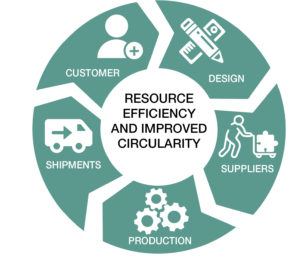Responsible Value Chain – Optimize our Environemntal Impact
Handicare’s value chain describes all of the general areas where we impact the climate and environment. The ambition is to, as far as possible, create value-generating activities and assume responsibility in every step of the value chain.

Design
Handicare aims to design products that are more durable and can be maintained, repaired and upgraded as well as methods to reuse and recycle them. During 2020, Handicare initiated a circular design project to improve the product and production development process. The Group plans to implement this new process in 2021.
By 2030, the goal is for 80% of the materials used in our products to be recyclable. To ensure that this goal is met, we have categorized the materials we use in our products and estimate that approximately 50% of materials are currently recyclable. For the Patient Handling business unit, we have divided the materials by product category and specified how they should be recycled. Much of the material we use in our products is recyclable, such as steel, aluminum, copper, plastic and wood.
Suppliers
Responsible purchasing means purchases that comply with Handicare’s values when it comes to ethical, social and environmental issues as
well as fulfilling our expectations in the areas of anti-corruption, labor standards and human rights. See more under the section Prosperity.
Production
Our production department is actively engaged in reducing our climate impact by continually striving to optimize and minimize energy consumption, material usage, waste and emissions.
Handicare’s production sites also work with recycling products so that they can be sold again. For example, seats and stairlifts are repaired and refurbished in the Netherlands, and battery packs are refurbished in the UK. The process produces savings in material use, energy consumption, waste and emissions. The remanufactured products have the same level of quality as new products.
Shipments
In 2020, Handicare initiated the Group’s first joint CO2 calculation according to Greenhouse Gas (GHG) Protocol scope 1 and 2. Scope 3 emissions (upstream and downstream) are to be surveyed and identified, and a strategy to reduce emissions is to be developed on the basis of materiality and right of disposition. Handicare will develop an emissions reduction plan during 2021.
Customer
Handicare offers products and solutions to improve quality of life and increase the independence of elderly and disabled people. Our products and solutions for all types of patient transfers improve health and safety for those working in hospital environments, acute care situations, group care homes and home environments. Our products are of high quality and have long service lives. Some of our products can be reused as well as recycled to a great extent.
We also offer relevant training in our business units. Our patient handling products reduce workplace injuries caused by transferring, lifting and mobilizing patients in the care sector, although training is also important to ensure our products are used correctly. We hold practical training pro- grams in lifting techniques where we describe different lifting situations. The goal is to provide knowledge about how to use the products correctly and efficiently to avoid strain injuries, and to demonstrate how patients, depending on ability, can play an active role in their own transfer, which increases their sense of independence. In the case of stairlifts, our goal is to train our distributors on stairlift installation so that we can guarantee a safe, durable product with a long service life as well as avoiding workplace injuries during installation.
The people we train in each market then train their coworkers. This is how we contribute to reducing workplace injuries in the care sector, both through our products and through training.
